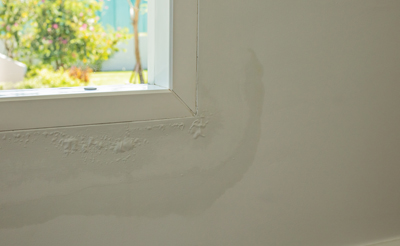
Water Will Come
Get Your Ducks in A Row
By David M. Milton, Esq. / Published February 2023

Florida has a well-deserved reputation for many things: world-class theme parks, stunning beaches, and, to the delight of outsiders everywhere, the exploits of the infamous “Florida Man.” We also accept, as an inescapable consequence of living in our state, that we must deal with hurricanes, tropical storms, and regularly scheduled summer thunderstorms. As obnoxious as these weather events might be to tourists, these heavy winds and rains often cause serious problems that end up on our desks. Board members have the duty to make decisions that address those problems. And as community association managers and other kinds of industry professionals, it is our privilege to help board members come up with effective solutions.
But before discussing how we can improve our ability to problem solve, it is helpful to consider what motivates us to solve those problems. Thinking about why we do what we do helps us to better understand how we can do it better.
First of all, Florida law does require board members and CAMs to perform certain basic functions. For instance, board members have a fiduciary duty. (See Florida Stat. Sections 718.11(1)(a) and 720.303(1).) And CAMs shall, among other things, “discharge duties performed on behalf of the association as authorized by this chapter loyally, skillfully, and diligently; dealing honestly and fairly; in good faith; with care and full disclosure to the community association; accounting for all funds; and not charging unreasonable or excessive fees.” (See Section 468.4334). Other industry professionals (e.g., lawyers) may have standards that set baselines for conduct. Compliance with those standards is essential, but those standards don’t tell us why we might sometimes push ourselves to give more than is required. What’s the why?
As board members, we live in the communities we’ve been elected to govern. We’ve purchased property in these communities, and like many Americans, these properties are our largest investments. But perhaps just as importantly, we’ve turned these properties into homes, homes that can provide a safe place for us and our pets and for our families and friends. After a long day of work (or perhaps a long day of working cooped up in a home office), we hope that our homes provide us with the space to enjoy the things we love. Doing our best as board members—keeping the community (including the buildings) safe, functioning as expected, and attractive—protects our investments and promotes our individual and overall health and well-being.
Board members aren’t alone in performing this meaningful undertaking. CAMs—persons who have applied for licensure, studied for and passed an exam, supplemented that knowledge by attending continuing education classes focused on industry issues, and who, by law, must have “a personal history of honesty, fairness, and respect for the rights of others and the laws of this state and nation”—can and should be hired to help. Most of the CAMs I know want to do a good job and are proud of the work they do, and it’s this attitude, which is hard to quantify, that sets CAMs and management companies apart.
So when problems arise, how can we improve our ability to make difficult decisions for the communities we live in or manage? The first step is getting the problem in front of the right person. Sometimes the scope of the problem is obvious, but other times the underlying issue isn’t apparent. This is where a CAM’s investment in his or her career/skills makes a remarkable difference.
Notably, there is no state law that compels a CAM to build his or her network, but good CAMs grow strong networks of industry professionals. (Board members can also help to build a network to benefit the association by attending tradeshows and the like.) CAMs with strong networks know the professionals and the scope of services they offer, and those CAMs know which professionals deliver on promises made. CAMs with extensive networks also know more than one professional who can investigate the problem and perform the work, so board members can have good options—not just options for the sake of checking a box—from which to choose (and on a related note, having competitive bids may be required by Florida law [i.e., Section 718.3026(1), Section 720.3055(1)] or by the association’s governing documents).
Take, for example, a leak at a second-story window of a townhouse building. If the CAM has relied on his or her network and presented the board members with several competitive bids, the board members now have decisions to make. The board members can choose from among the industry professionals recommended by the CAM, or the board members can allow a homeowner/maintenance person to attempt to identify the cause of the problem and perform the repairs. There are, admittedly, what look like benefits to using a homeowner/maintenance person. Typically, a homeowner/maintenance person will be less expensive (or even free!) and more available (right now!); and when the budget is tight and time is of the essence, it is tempting to approve repairs that are less expensive and can begin immediately. But to borrow a phrase from my English grandmother, choosing to use anything other than a professional would, especially in this situation, be penny wise and pound foolish. Industry professionals offer several significant advantages.
First, when you hire an industry professional, you are buying that professional’s expertise (and other things like helpful connections with subcontractors and suppliers). That means you can depend on the professional to use his or her education, training, and experience to identify the cause of the problem, propose potential solutions, and perform quality work.
Second, by paying for expertise and obtaining high-quality service, you’re more likely to avoid problems. But if there are issues, your selection of an industry professional (even though that professional might be more expensive) provides numerous benefits. For instance, if there are post-repair punch-list items or touch-up work, a professional will often address those items without requiring dozens of follow-up phone calls and emails.
And if those minor issues turn into major problems, you’ve purchased that professional’s accountability. Consider the following scenario: an association’s perimeter wall is in shoddy shape, so the association hires a contractor with the lowest price (price was the primary factor considered). Three months later bricks are falling from the wall and homeowners are making complaints, and when the association turns to the contractor for accountability, the contractor has disappeared or has worthless insurance. The association didn’t get the expertise it needed, and now there’s nobody accountable for the problem that continues to exist or for the problem that has been made even worse. Hiring an industry professional can avoid some of these serious issues.
Third, when you hire an industry professional (or when you, as a CAM, advise board members to hire a professional), you’re protecting yourself. Florida’s business judgment rule protects board members from liability for decisions if the decisions are informed and made in good faith. In Miller v. Homeland Property Owners Association, Inc., 284 So. 3d 435 (Fla. 4th DCA 2019), a homeowner challenged the board’s approval of another homeowner’s garage addition. The trial court rejected the challenge, and on appeal the appellate court upheld the trial court’s ruling, noting, “[T]he Association acted reasonably by accepting the opinion of the construction firm, the county official, and its own attorney.” The holding in Miller is consistent with other cases discussing the business judgment rule. See South End Improvement Group, Inc. v. Mulliken, 602 So. 2d 1327, 1333 (Fla. 4th DCA 1992), stating, “The business judgment rule protects certain decisions of the board from scrutiny by the court if the board makes a good faith informed decision”; see also TSG Water Resources, Inc. v. D’Alba & Donovan Certified Public Accountants, P.C., 260 Fed. Appx. 191, 197 (11th Cir. 2007), noting, “The business judgment rule protects directors and officers from liability when they make good faith business decisions in an informed and deliberate manner”. The lesson? Hire industry professionals to help you solve your problems.
That’s the general playbook to follow; when issues arise, obtain estimates from several reputable industry professionals and then make an informed decision. But an ounce of prevention is worth a pound of cure. Assuming people can be persuaded to take proactive steps to prevent problems, prevention can still be challenging because problems lurking are, by their nature, hard to find. There is, however, a solution: industry professionals.
There are several industry professionals who provide pre-hurricane season inspections. These inspections—often focused on roofs, walls, and windows—can uncover issues before the issues become overwhelming and difficult (read: expensive) to fix, and these inspections can document the condition of the community in case a post-storm insurance claim must be made.
The streets and stormwater drainage systems are equally important, but because we don’t stare at these components—they’re often under our feet or out of sight—these areas are often ignored. Overlooking these components can have disastrous consequences; with hurricanes, tropical storms, and summer downpours releasing tons of water, top-notch streets and stormwater drainage systems keep our communities from flooding. These components can be constructed defectively or maintained insufficiently (if at all), so it is essential to hire industry professionals who specialize in this kind of work and can spot problems that are undetectable to the untrained eye.
David Milton
Attorney, Becker
David Milton is an attorney in Becker’s Construction Law and Litigation Practice. He represents community associations in multi-party construction defect litigation, frequently meeting with association board members and managers to evaluate potential construction defect claims and discuss legal options and strategy. Mr. Milton guides clients through the Chapter 558 claims process as well as conducts board meetings, and special member meetings under Chapter 720, to provide information to and resolve concerns of board members and homeowners. For more information visit www.beckerlawyers.com.





